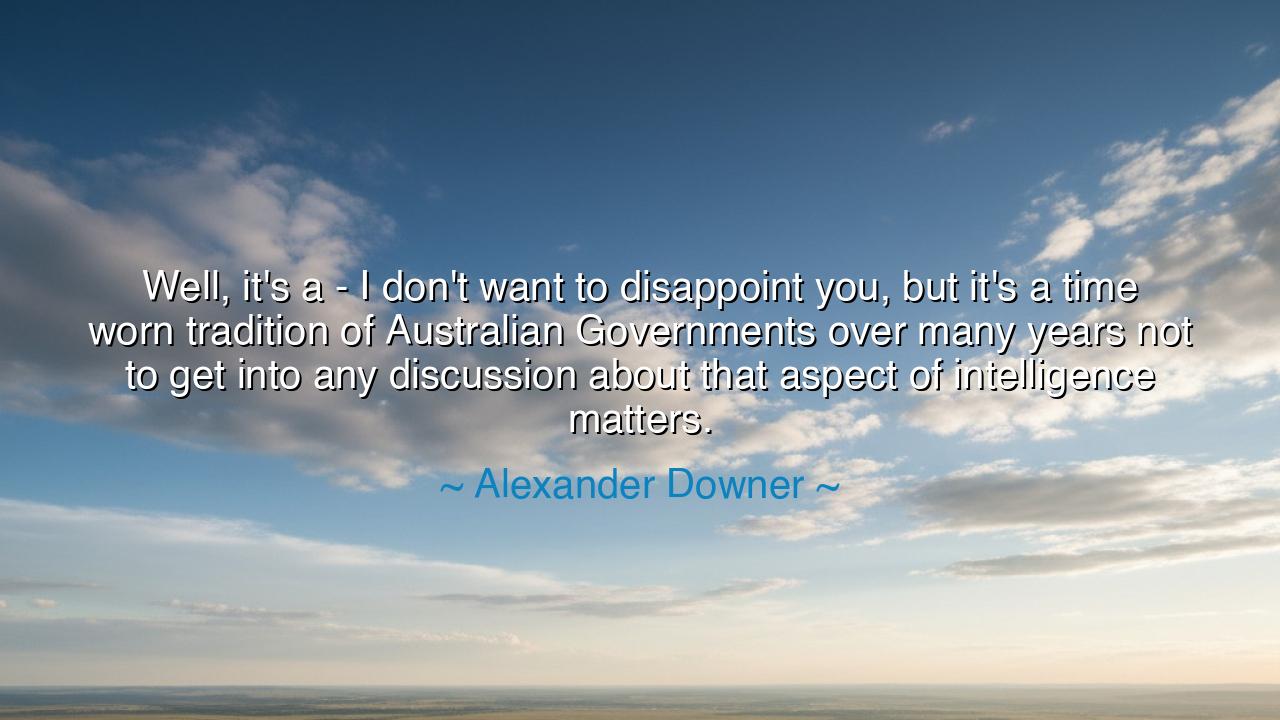
Well, it's a - I don't want to disappoint you, but it's a time
Well, it's a - I don't want to disappoint you, but it's a time worn tradition of Australian Governments over many years not to get into any discussion about that aspect of intelligence matters.






Here is a reflective, ancient-style interpretation of Alexander Downer’s quote:
The Silence of the Wise
When Alexander Downer said, “Well, it's a – I don't want to disappoint you, but it's a time worn tradition of Australian Governments over many years not to get into any discussion about that aspect of intelligence matters,” he spoke not merely of diplomacy, but of discipline — the ancient art of knowing when to speak and when to be silent. His words, though framed in the formal restraint of politics, echo a truth as old as civilization itself: that wisdom often hides itself in silence, and that discretion, not revelation, is the truest mark of understanding.
For the affairs of intelligence are like the unseen currents beneath the ocean’s surface — powerful, dangerous, and essential. To speak too freely of them is to stir the deep and summon storms. Downer’s statement, spoken with calm restraint, embodies the principle that has guarded nations and leaders for generations: secrecy in service of safety, silence as a form of strength. It is a reminder that there are truths so delicate they cannot be handled by words without breaking their power.
The ancients understood this. The philosopher Solon of Athens, when questioned about matters of war and strategy, replied simply, “He who tells his plans to all, prepares his own defeat.” The wisdom of Solon lives again in Downer’s words — not the secrecy of deceit, but the silence of guardianship. A statesman’s tongue must be as careful as a sword in its sheath; for though words weigh nothing, their consequence can move armies and shape destinies. Thus, the “time-worn tradition” is not avoidance, but protection — a covenant between duty and discretion.
In the halls of government and intelligence, this restraint becomes sacred. History bears witness to those who broke the silence unwisely. The betrayal of secrets has undone empires, toppled kings, and cost countless lives. Yet it has also been through the steadfast silence of the disciplined that nations have endured their darkest hours. The code Downer invoked — this tradition of discretion — is not a relic of caution, but a living shield that guards the balance between transparency and survival.
Consider the tale of Queen Elizabeth I and her spymaster, Sir Francis Walsingham, who in the 16th century built the first great web of English intelligence. Through careful secrecy and controlled knowledge, they uncovered conspiracies that threatened the crown and the peace of England. Walsingham spoke little, acted quietly, and trusted few — and through his silence, he preserved a kingdom. It was not the boastful who secured the realm, but the ones who held their peace until action, not words, could speak for them.
There is in Downer’s tone also a measure of humility — the recognition that not all knowledge is meant for public gaze. The modern world prizes openness, yet confuses it with wisdom. To reveal everything is to strip away the mystery that guards truth. Just as a seed must remain hidden beneath the soil to grow, some matters must remain unspoken to bear fruit. Silence, in such cases, is not a denial of truth but a gesture of stewardship — the patient tending of that which must ripen in secret before it can be revealed.
Therefore, O listener, learn this lesson: to speak wisely, one must first master silence. In times of tension, hold your tongue until your heart has weighed your words. In matters of trust, reveal only what strengthens, not what endangers. Whether in the affairs of nations or in the conversations of daily life, the art of restraint is the foundation of peace. The fool rushes to declare; the sage waits to discern.
For silence, when guided by wisdom, is not emptiness — it is power contained. Let your words be few, your thoughts deep, and your integrity steadfast. In this way, you too shall walk the path of the wise — guardians not only of secrets, but of the fragile harmony that holds the world together.






AAdministratorAdministrator
Welcome, honored guests. Please leave a comment, we will respond soon